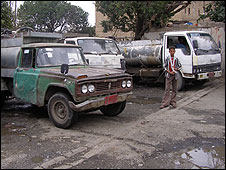
Yemen is projected to be the first Arab country that will use up all of its groundwater, but no-one knows exactly when the water table will dry out or fall beyond a viable level for human use.
In a race to shape public opinion, the government has developed a national mascot to encourage water conservation.
Rowyan is an animated raindrop, a cheery cartoon character with moustache and headdress. His wife, Rowyana, has curling eyelashes. She carries a handbag and wears a veil and full-length black robes.
"Rowyan is one of the tools we're using to promote public awareness," says Salim Bashueib, chairman of the National Water Resource Authority - which issues licences for new water wells and uses a satellite tracking system to monitor the movements of drill rigs.
"People won't respect the laws on water use if they don't understand the scale of the problem and the reason for compliance."
Visual impact
Yemen's national water conservation campaign is one of the first to be launched in the Middle East.
"It's a new approach," says Jochen Renger, head of GTZ's water sector programme in Yemen. GTZ is a German development organisation that invented the mascot in co-operation with the Yemeni government and the United Nations Development Programme.
"All over the world, water issues are tackled by engineers, who focus on pipes and pumps. We wanted to complement their technical expertise by introducing Rowyan as the flagship of the National Water Resources Authority."
The Arabic adjective rowyan - and the feminine version rowyana - means "I've had enough water" and the message is simply to make more efficient use of every drop.
Rowyan's visual impact is designed to appeal in a country with low literacy levels, where advertising and market research are limited. Rowyan is also intended to attract children, who will influence future water use.
"We've already seen high demand for Rowyan products, such as spare wheel covers, posters and bags," says Mr Renger.
"Rowyan really seems to have captured the public's imagination. This indicates people are receptive to the message at some level. But is there a behavioural change? We don't know yet."
Director of the Yemen Polling Centre Hafez Bukari says Rowyan could have a powerful impact if all the relevant government ministries and international donors support the initiative.
"Communication between water institutions is currently very poor. Our research has shown that Yemenis are confused. They don't know who's in charge of water issues and they're not receiving a single coordinated message from the authorities."
Local empowerment
Within the past few months, Yemen has implemented a fast-track decentralisation programme. Competency for water resources is being devolved to the local level.
There are 14 water basins in Yemen, and each one will have a water basin committee - a sort of water parliament.
"These steps will hopefully lead to more transparent procedures and accountability. The challenge is to empower local committees with technical ability and understanding of water management issues," says GTZ's Jochen Renger.
About 90% of Yemen's ground water is currently used to irrigate high-value qat crops - a mildly narcotic leaf, chewed for pleasure and much-loved by Yemenis. Qat farmers rely on subsidised diesel to power their water pumps.
Landowners are supposed to obtain a permit to drill new wells but the sector is poorly regulated.
Decades of random drilling have depleted Yemen's aquifers, extracting groundwater faster than rainfall can replenish supplies.
Rigs are now boring well shafts to mine fossil water that was capped and sealed in the rocks during prehistoric geological change.
"Unlicensed drill rigs are like heavy weaponry in the hands of terrorists," says Water Minister Abdul Rahman al-Iryani.
"They don't kill people immediately, because their impact is delayed, but water shortages will take a deadly toll within the next generation."



